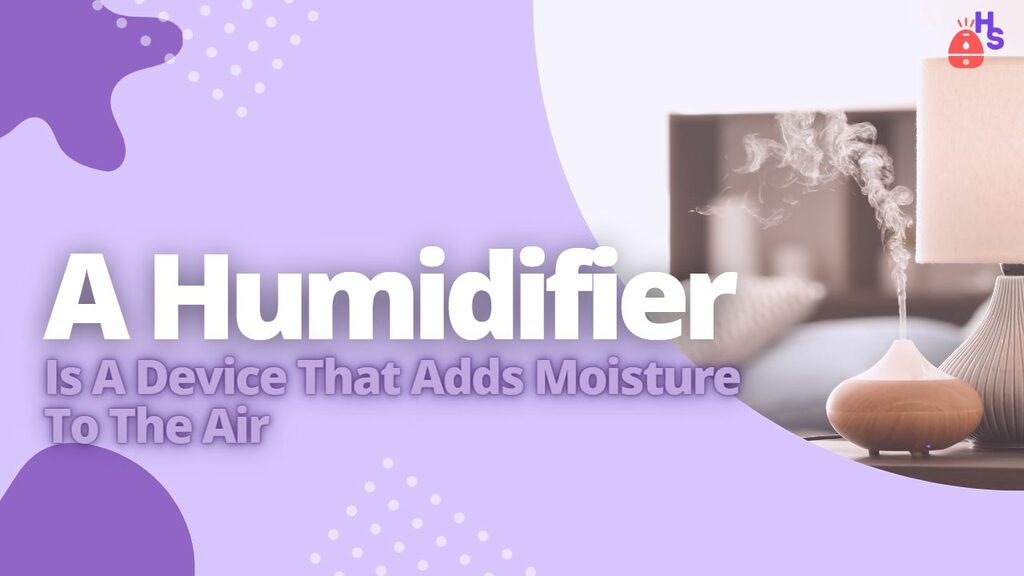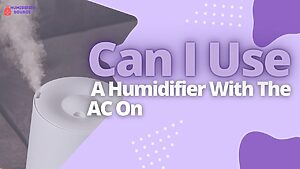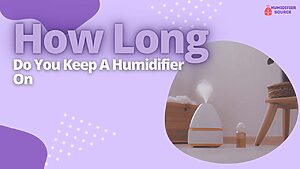No, humidifiers are not bad for computers. They can extend your computer’s life by preventing static electricity from building up and damaging components.
A humidifier might be the answer if you’re looking for a way to protect your computer from static electricity.
Key Takeaway’s
- Humidifiers can be bad for computers because they can add moisture to the air, leading to condensation on the computer components.
- If there is too much moisture in the air, it can also cause corrosion on the components.
- It is important to ensure that the humidifier is not placed too close to the computer and that it is kept at a reasonable level so that it does not add too much moisture to the air.
- If you are using a humidifier, it is important to monitor the room’s humidity level and ensure it does not get too high.
- Suppose you notice any condensation or corrosion on your computer components. In that case, you should stop using the humidifier and take steps to dry out your computer.

Here’s The Answer To Are Humidifiers Bad For Computers
It is a common misconception that humidifiers are bad for computers. However, this is not the case. Humidifiers can be beneficial for computers. Here’s why:
Humidifiers prevent static electricity from damaging computer components. Static electricity is created when there is an imbalance of electrons on surfaces.
When static electricity comes into contact with sensitive computer components, it can cause damage. Humidifiers help to prevent this by keeping the air moist and reducing the amount of static electricity that can build up on surfaces.
Humidifiers can help to reduce the risk of condensation forming on computer components.
Water droplets form on cold surfaces as a result of condensation, which happens when warm air meets them.
A Humidifier Is A Device That Adds Moisture To The Air

Humidifiers are used to prevent dry air and dry skin, as well as help with allergies. They can be placed in homes, cars, offices, or anywhere else you need extra moisture in the air.
Computers Are Sensitive To Changes In Humidity And Can Be Damaged By Excessive Moisture
Humidifiers can increase the relative humidity of a room, which means they add extra moisture to the air.
The amount of moisture in a given air volume as compared to the maximum amount that air could hold at that temperature and pressure is known as relative humidity.
Humidifiers are typically designed to maintain low levels of relative humidity (30–50%) since this is optimal for human comfort and prevents damage from excess moisture build-up on surfaces like floors, walls and furniture.
Computers are sensitive to changes in humidity because they operate most efficiently at low levels: anything above 60% can cause problems such as rusting or shorting components, while anything below 40% can lead to hard drive failure due to excessive heat buildup within components such as CPUs and RAM modules.
Humidifiers Can Increase The Relative Humidity Of A Room, Which Can Lead To Condensation
Humidifiers are designed to increase the relative humidity of a room. This means that they can lead to surface condensation and potential damage to electronics.
Condensation occurs when a material’s vapor pressure is lower than its surrounding air’s pressure. In other words, it occurs when water vapor in the air gets cool enough that it turns into liquid water (or ice).
Make sure that whatever device you use with your humidifier has plenty of ventilation holes for airflow. Make sure there’s enough space between where the humidifier sits on top and where your computer sits below it so that air can pass through without getting blocked by either surface.
It Is Important To Monitor The Relative Humidity Of A Room When Using A Humidifier
Due to the fact that it depends on the particular computer model you own, this question can be difficult to answer.
Generally speaking, if your computer has a built-in fan connected directly to the motherboard (i.e., it’s not an external add-on), then too much humidity might pose a danger.
If you’re using an old-fashioned desktop tower and keeping it in your basement during winter, for example, and there’s no dehumidifier running, the water vapor could start condensing inside your machine and cause damage over time.
The good news is that most modern PCs are designed with this in mind: they’ll usually shut themselves off before anything serious happens.
There Are Ways To Protect Your Computer From Damage Caused By Humidifiers
You can do several things to protect your computer from damage caused by humidifiers.
- Get a Dehumidifier: This will prevent the room from being too humid, which helps protect against mold and dust that could potentially damage the computer.
- Place Your Computer In A Sealed Container: If you have a sealed container, like a Tupperware bin or plastic bag, place it over your computer so that no moisture comes in contact with it. This will also prevent mold from forming on any surfaces near where you store your machine and prevent dust accumulation on its surface while in storage!
- Place Your Computer In A Room With Low Humidity: If possible, keep your PC in an area of low humidity, so there aren’t any surprises during use later down the road (i.e., after buying one).
How Can You Tell If A Humidifier Is Causing Problems With Your Computer?

If a humidifier is causing problems for your computer, it’s usually obvious. Look for condensation on the case or other components of your computer. If a humidifier is doing this, it could damage your computer’s inside.
Other signs that a humidifier may be harming your machine:
- A reduction in airflow inside the case can indicate that dust has accumulated or cables have become disconnected.
- An increase in noise comes from fans and hard drives as they work harder to compensate for increased heat caused by internal condensation.
What Are Some Tips For Avoiding Humidifier Damage To Your Computer?
If you want to use a humidifier, increase your home’s relative humidity to at least 50%.
Humidifiers can be bad for computers because they add moisture to the air.
Static electricity can accumulate in the air if it is too dry, which can harm the internal parts of your computer.
Here are some tips for avoiding humidifier damage:
- Keep your computer off the floor.
- Place it on a table or desk instead of directly on the floor (if possible). This will help reduce dust buildup in its internal parts. If this isn’t possible, try using a laptop stand so that it doesn’t touch anything while sitting upright on its own—this might prevent some dust from getting into sensitive areas like its power supply or fan vents, where they could cause damage over time if left unchecked.
- Avoid placing near windows that receive direct sunlight exposure during daytime hours–especially during summer when heat waves may contribute additional heat energy into an already humid environment (this can cause condensation inside these small spaces, which may result in short-circuiting). Instead, try installing window shades around any windows.
Can Humidifiers Be Used Safely With Other Electronic Devices?
Are humidifiers bad for computers? The short answer is yes. But you don’t have to take your computer out of its place to protect it from the effects of humidity.
A common myth about using humidifiers in your home is that you must place them directly on top of your computer.
This is not true! As long as you keep your humidifier away from where it can drip down onto or near the keyboard or other components, there should be no problem with using a humidifier to help relieve discomfort caused by dry air in the winter months.
If you’re worried about mold growth or other problems brought on by too much moisture in your home during the cold seasons, you might also think about using an air purifier or dehumidifier to remove moisture from the air.
Bottom Line
As it turns out, humidifiers can be bad for computers. The moisture in the air can cause condensation on electronic components, which can lead to corrosion.
So if you’re using a humidifier in your home office, keeping it away from your computer and other electronics is important.
If you’re looking for ways to improve the air quality in your home office, check out our other articles on our website or ask us questions on our social media channels.
Frequently Asked Questions
Is a humidifier bad for my computer?
A humidifier can be bad for your computer in a few ways. Humidifiers can cause condensation on electronic components, which can short them out and lead to corrosion. The moisture in the air can also make it harder for your computer to keep itself cool. Humidity is known to increase allergies in some people and could lead to problems with computer performance or even serious health issues.
What are the benefits of using a humidifier?
Humidifiers can help to prevent condensation from forming on surfaces which can short out electronics. The air’s moisture can also help keep your computer cool, which is important if you have delicate or expensive equipment. And finally, humidity is known to increase productivity and concentration levels in some people, so it may be worth considering if you’re struggling with those same issues.
How often should I use my humidifier?
Humidifiers may vary, but you should generally use your humidifier daily if it’s in your workplace. If it’s a smaller humidifier you can take with you when you leave the house, you may only need to use it once or twice a week. If your humidifier is larger and needs to stay plugged into an outlet, then using it daily is likely required.
Can I use a humidifier with my computer in the same room?
No, humidifiers should not be used in the same room as your computer. The moisture in the air may condense on your computer and short out its electronics. Using a humidifier near electronic equipment can also increase your risk of electrical shock.
Author
- The Right Way To Fill A Humidifier: Hot Or Cold Water?
- Humidifier And AC: Is It A Match Made In Heaven?
- Can I Use A Humidifier With The Window Open (Solve Your Dilemma)
- Perfect Air Quality: How Long To Run Your Humidifier
- Should You Have A Humidifier In Nursery (The Surprising Benefits)
- Humidifiers In Bedrooms: A Guide To Good Placement









